Duong Lam Ancient Village
Retaining the basic characteristics of Vietnamese ancient villages, Duong Lam ancient village with its unique architecture has welcomed many tourists from all over the world. Covered with banyan trees’ generous shades, the village brings about the peaceful atmosphere at its best.
Far from Hanoi centre, about 50km, Duong Lam ancient village is located in Son Tay Town, Hanoi. The whole village is considered as a unique laterite museum with ancient houses dating back more than 400 years ago. Duong Lam was the home of 2 Vietnamese kings, Ngo Quyen and Phung Hung. Their mausoleum is still located here. The village was recognized as a National Historic & Cultural Monument on May 19th, 2006. It is the first ancient village of Vietnam to be recognized.
Different from Hoi An’s ancient town or Hanoi Old Quarter’s vibrant vibe of urban lifestyle in the earlier centuries, this ancient village is more like a rural area, heavily affected by agricultural lifestyle. Strongly inspired by Vietnamese traditional culture, It has a main wooden gate with porticoes curvy roof (which is typical in Northern area). Surrounding the village is the system of ponds creating charming scenery, which helps to reduce the heat of summer during extremely hot days of the North. A large number of ancient houses built with laterite and ironwood pillars gives the village a very special ancient beauty. Most ancient houses maintained fences, gates, courtyard, gardens, the main house, outbuildings, kitchens, ranches, …, which are familiar specifically to the image of Thang Long – Hanoi.
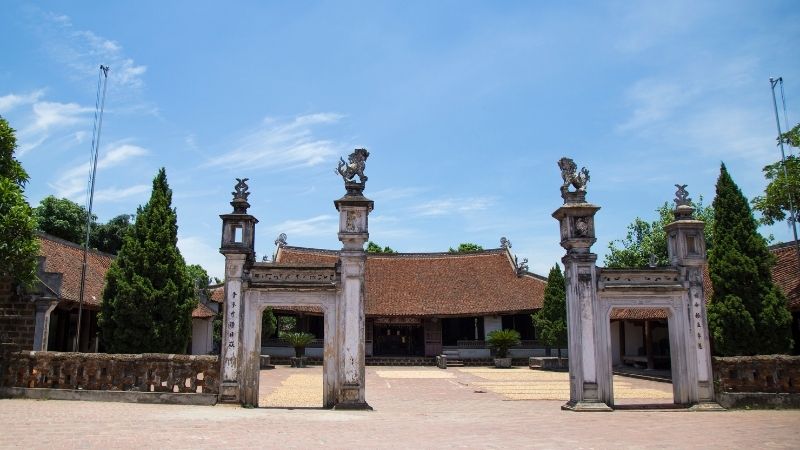
Duong Lam Ancient Village
How to get to
By bus
Heading to Son Tay province to visit on a bus is a good idea for travellers. Take bus No. 71, if you are coming from My Dinh station; bus No. 70, if you are coming from Kim Ma station; or bus No. 77, if you are coming from Ha Dong station. All the bus routes stop at Son Tay station, where you can take a taxi or xe om (taxi bike) to arrive. However, you still need to walk around the wide-area to explore each of the historical attractions. If walking around takes too much time and effort, you can try renting a bicycle. They offer hourly rent or full-day rent depending on your preference.
By private car or motorbike
The distance is not too far, if you want to have more experience, you can travel by private car or motorbike. There are 2 ways for you to go:
- Follow Thang Long Avenue and turn right at Hoa Lac intersection. Next, follow Road 21 through Son Loc to the intersection of Road 32 and follow the signboard to Duong Lam village;
- Follow Route 32 to Son Tay town. Go along Road 21 and find the intersection on the left-hand side to go to village gate.
By full package day tours
Besides the 3 ways above, you can choose full package Duong Lam day tours because it is a famous attraction in Hanoi. Tourism agencies will provide package tours as well as advise the best travel route to visit village and other attractions in Hanoi. If you are a foreign tourist, you should choose this way to have the most convenient and safest journey.
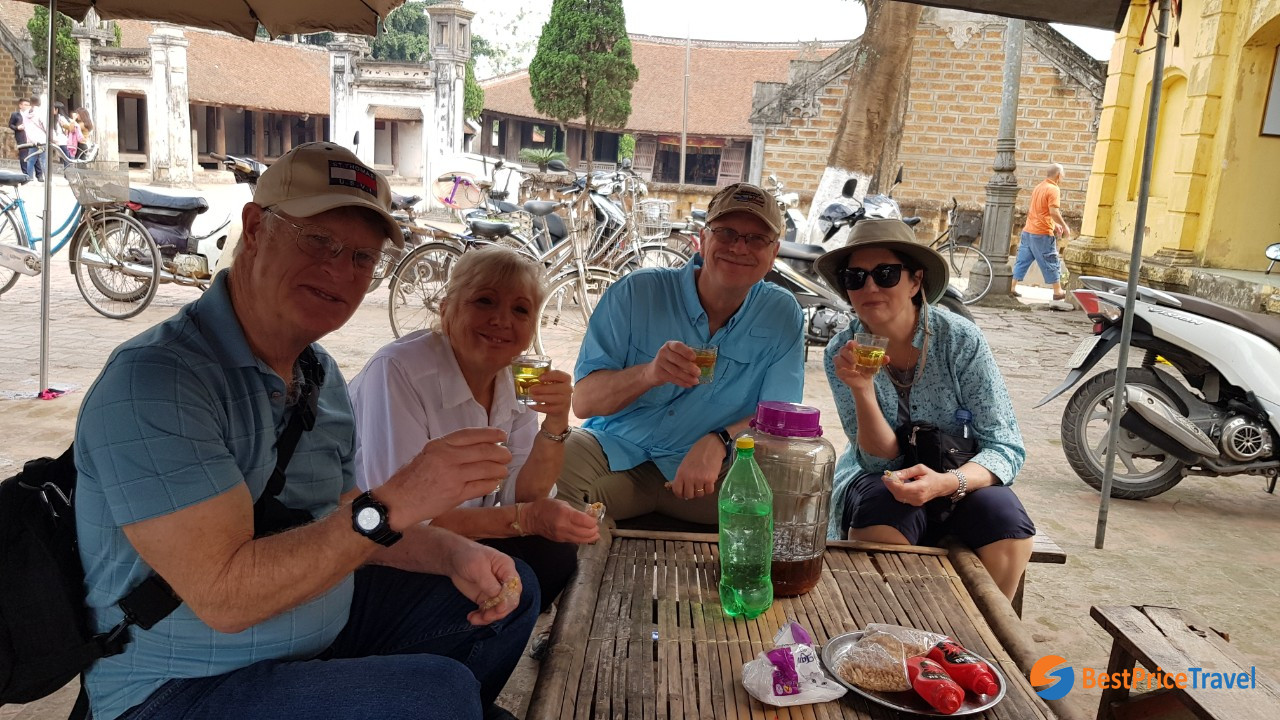
Duong Lam Ancient Village tour
Things to do at Duong Lam Ancient Village
Cycle to visit ancient houses, temples, and pagodas
Tourists are suggested to come to Mia Pagoda (built-in 15th century and admire 287 statues of all sizes), Mong Phu communal house’s gate (built-in 1833), Ngo Quyen Mausoleum (a national hero who fought against Mongolian armed force in 938) and Tay Phuong Pagoda on the way walking around. Built-in the 8th century, Tay Phuong Pagoda is the best instance of old typical pagodas in the North of Vietnam. You might want to see the 18 ancient Arhan statues located in Tay Phuong Pagoda.
Enjoy tea time with villagers
Walking around village, you will see a lot of small wooden drinks stalls, looking very peaceful. Having been walking for a long time and a bit hungry, tourists can rest in a small roadside stall. “Che lam” candy and lid eugenia tea are easy to find here. Sitting and talking with the shopkeeper, do you share that there are two kinds of lam tea here, lam Gac tea and regular lam tea. Every type is delicious, has its own unique taste, everyone who comes here must bring some of this unique flavour as a gift.
There are also a lot of ramie leaf rice cake makers, ramie trees grow anywhere, they collect the leaves, dry them and squeeze the black water from the ramie leaves to create delicious cakes. Ramie leaf rice cake is a very traditional and interesting Vietnamese dish.
Enjoy the local life
Van Phuc silk village can be an interesting stop for your trip. With the fame of Vietnam’s best silk produced from once, Van Phuc silk village offers travelers knowledge about the silk-making process and the finest silk products at affordable prices to bring back home. Additionally, if you are spending more time enjoying the peaceful atmosphere, having lunch prepared by the local host is undoubtedly a new experience for all modern citizens, especially for foreigners.
Some must-try local foods for travelers are roasted pork, traditional soy sauce, Mia chicken, peanut candy, etc. Duong Lam’s villagers are friendly and hospitable. You may join them in producing local specialities such as soft green-lentil cake and rice cake filled with brown onion if you are lucky enough to come at the right time.
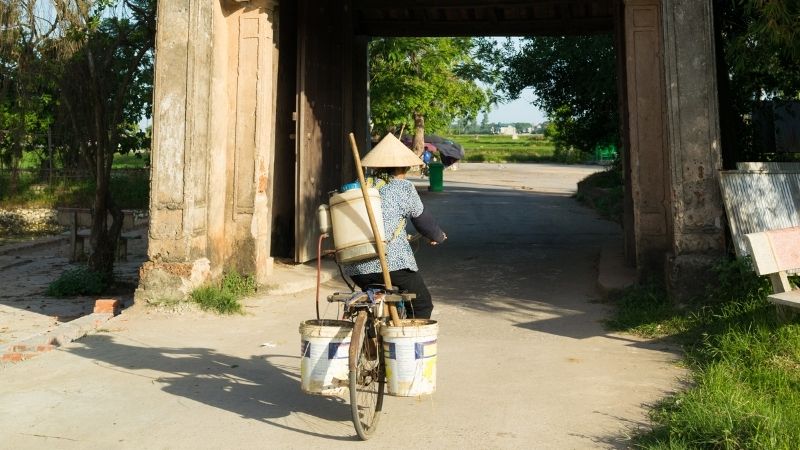
Local life in Duong lam
Thanks to the demand of staying for the night at the ancient village, there is a homestay opened in the area to serve the special guests coming from all over the world. The homestay is located in He quarter (called “Xom He”), Mong Phu, Duong Lam village, Son Tay province, Ha Noi. Decorated as much alike as possible, staying the night at the homestay can give tourists the feeling of being a part of the ancient village with a peaceful, traditional Northern Vietnamese lifestyle. If you are much of a cultural explorer, the place is definitely where you meant to come.
Duong Lam local specialities
Coming to Duong Lam, you can see “Che Lam” candy makers everywhere. "Che Lam" candy is sold everywhere in village, it is a folk speciality that you can enjoy when you go anywhere. There also have many specialties such as peanut candies, sesame candies, ramie leaf rice cake, or rice cakes, whose taste is very delicious and characteristic.
And mentioning Duong Lam, we cannot help but mention Rice sauce. Rice sauce is always a popular dish of everyone, every house. Rice sauce can be eaten with both raw and fried tofu, fish stew, seasoning spinach, sweet vegetables, meat stew. Fish is stewed with rice sauce and some other spices such as brown sugary water, a few slices of galangal, a few pieces of bacon, then cook them in a terracotta pot, making the fish very soft and no fishy. All of the specialities here have created a very unique feature for village.
Where to visit in Duong Lam Ancient Village
Duong Lam ancient houses complex
The total area of Duong Lam village is 800.25ha wide. The complex of the ancient village has 9 small villages, which are Mong Phu, Dong Sang, Doai Giap, Cam Thinh, Cam Lam, Phu Khang, Ha Tan, Hung Thinh, and Van Mieu in Son Tay city. The village now has 956 old houses, many of which were built in the years 1649, 1703, 1850, etc. These old houses are all built from traditional materials such as laterite, wood, bamboo, terracotta brick, tile, etc. with 5 or 7 compartments.
- Mrs. Dien's old house: This house is about 200 years old. Inside the house, Mrs. Dien's granddaughter will welcome visitors who want to learn about this house with lid eugenia tea and traditional “Che Lam” candy. The house has 3 compartments following the old Northern architecture style, an altar is placed in the center and towards the door, there are a flower garden and old wine jars on the yard.
- Mr. Hung’s old house: the oldest house in Mong Phu village. This house was built in 1649 until now it has been nearly 400 years with 12 generations living here. As soon as you arrived at the gate, you will able to see an old gate built of rock, soil, and mud to create adhesive. The house is structured with 5 compartments: the 3 middle compartments are the place to worship ancestors, and the 2 compartments that remain are bedrooms. In the yard is a typical garden with flowers and wine jars creating a very peaceful beauty. Nowadays, Mr. Hung’s old house has been preserved almost intact the quintessence of Vietnamese architecture.
- Mr. The’s old house: Located in Xui hamlet, Mong Phu village, Mr. The's old house has 7 compartments built in the traditional way and using mortises, not using nails. There are 14 generations living here and this family is famous for making sauces. As soon as you stepped into the yard, there was a very fragrant smell of rice sauce, along with the jars of rice sauce put close together. There has a grind corn machine with a lot of corn hanging on the horizontal bar like many other houses in Vietnam's North mountains.
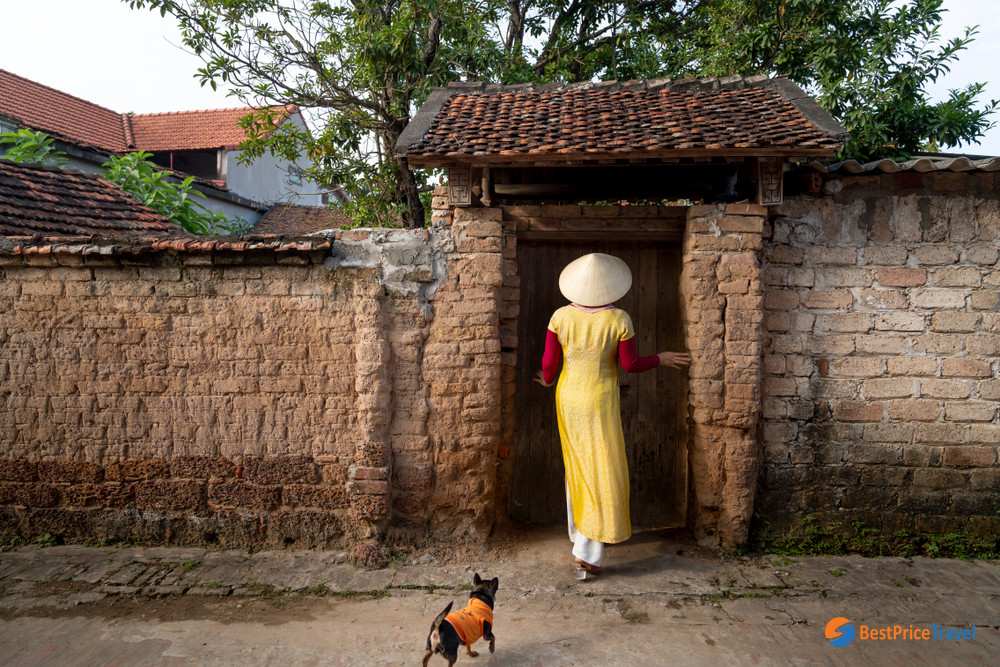
Duong Lam Ancient House
Mong Phu village gate
With the style: Gate lower - house upper, Mong Phu village gate has characteristics of Le Dynasty architecture. In the past, the village gate was a resting place for farmers, patrolmen, and villagers. This is also a place that villagers who live far away from home always miss.
Like many other feudal village gates, Mong Phu village gate is made of laterite with two gates made of wood. To the right of the gate is a large lake and to the left is a big thousand years old - tree. Because of this peaceful scene, Mong Phu village gate is not only an interesting attraction but also a good place to take pictures for tourists when coming to village.
Located in the center of Duong Lam, Mong Phu communal house represents the traditional architecture of the northern delta region in the past. According to historians, Mong Phu communal house was built in the Late Le period (14th century), under King Le Than Tong. Mong Phu communal house worships Tan Vien Son Thanh, The leader of the four immortals of the Vietnamese to become the village god. By the 12th Emperor Tu Duc (1859), the communal house was expanded and its architecture remained intact since then.
Mong Phu communal house
Mong Phu communal house festival takes place on January 8, 9, and 10 of the lunar calendar, with many cultural and historical values. Nowadays, Mong Phu communal house is a tourist attraction attracting a large number of domestic and foreign tourists.
Tham Hoa Giang Van Minh worship house was built during the King Tu Duc dynasty to worship Tham Hoa Giang Van Minh (1573-1637), who was sent to China by King Le Than Tong. He bravely responded to protect Vietnam’s honor against the insults of China King.

Mong Phu Communal House
Tham Hoa Giang Van Minh worship house
Located in the heart of Duong Lam ancient village, Tham Hoa Giang Van Minh worship house is becoming a destination to visit and learn for many domestic and foreign tourists. However, over a long period of time, many items and wooden structures of Tham Hoa Giang Van Minh worship house are being degraded. Hope that the worship house will receive the State's investment soon to restore, repair, worthy of Tham Hoa Giang Van Minh’s merits and also a traditional patriotic education for Vietnamese young generations.
Having arrived at Duong Lam village, people cannot help but mention the Mong Phu Catholic Church. Mong Phu Catholic Church was built in 1954 and is a unique feature in the overall Vietnamese architecture here. Today, the church still has people coming to pray in the church. On special occasions, masses are held with the participation of many villagers and tourists.
Mia Pagoda
It was still recorded that Mia Pagoda was built a very long time ago. In 1632, Mrs. Ngo Thi Ngoc Dieu, a wife of Trinh Trang lord, saw that the pagoda was abandoned, so she and her family and villagers in Cam Gia village (Mia village) rebuilt together. Mrs. Ngoc Dieu came from Nam Nguyen (Nam An), which belongs to Mia village, so villagers admired her as "Lady Mia" and carved statues to worship at the pagoda and also has an own shrine. Later, the pagoda was restored many times, but up to now, Mia Pagoda is still preserved intact.
There are many statues in Mia Pagoda with 287 big and small statues, including 6 bronze statues, 106 wooden statues, and 174 statues of terracotta and painted with gold paint. The delicacy of these statues shows high artistic expression through the ingenuity and talent of the ancient makers, many of them are considered as fine artworks in Vietnam, such as a set of eight statues of Bat Bo Kim Cuong made of terracotta: each statue is a general preparing to fight to eliminate evil and protect Buddhism.
Doai Giap temple
Doai Giap temple was built in the reign of Emperor Ngo Quyen (about the tenth century), at that time, the temple was just a small temple built by the villagers to commemorate the merits of Bo Cai Dai Vuong Phung Hung and worship him as the guardian god of the village. Doai Giap temple is located on beautiful, airy land in Duong Lam village, in front of the temple is a large quadrilateral-shaped lake, facing the southwest.
The ancients were very clever when choosing space for landscape and feng-shui that very suitable for the spiritual beliefs and aspirations of the villagers, behind the temple is a large fruit garden, on the left and right sides of the temple are 2 wells built of laterite. With the typical cultural and historical values, the Doai Giap temple was ranked by the State in 1996, the festival of Doai Giap temple takes place in 2 days: January 7th -8th of the lunar calendar. Besides the sacred and solemn ceremony, the villagers also enjoy and participate in many folk games, traditional cultural, and special performances.
Phung Hung Temple
There are many Phung Hung temples in Vietnam, but the one in Duong Lam village has the largest scale, the most unique architecture, contains the most historical and cultural values. However, the temple's appearance today is due to a major restoration in 1889 (the reign of King Thanh Thai) so Phung Hung temple has the architecture of the Nguyen Dynasty in the early years of the twentieth century.
In the temple, there is a stele “Phung Tu Bi ky” at Doai Giap communal house carved in the 4th year of Hong Duc (1473), which has recorded a lot of information about Phung Hung’s life and merits. On January 8th of the lunar calendar every year, Duong Lam’s villagers and Phung's descendants, tourists coming here to pay homage to Phung Hung.
Ngo Quyen temple and tomb
Ngo Quyen temple and tomb were built on a high hill, called Cam hill, facing to the east. The temple was built above, about 100 meters from the tomb. The tomb of King Ngo Quyen was built in the 27th Tu Duc year (1874) and restored in the 2nd Minh Menh year (1821). The tomb is built in the style of a gravestone house, about 1.5m high. In the middle of the tomb is a throne, in the gravestone has four Chinese letters "Tien Ngo Vuong Lang" (Tomb of King Ngo Quyen).
Every year on August 14th of the lunar calendar (the death anniversary of King Ngo Quyen), people in the region come here to commemorate his merit - the king who fight against China to end over 1,000 years of domination, opening a new and independent period in Vietnam history.
Best time to visit Duong Lam Ancient Village
Traveling to Duong Lam ancient village at any time of the year is fine. However, if you want to see all the beauty of the Vietnamese countryside in ancient times, you should go in the harvest season around May, June, or the festive season in January of the lunar calendar every year. If you come during the harvest season, you will not only see the ancient and rustic beauty of Vietnamese villages but also see the peaceful and poetic countryside. The golden fields, straw heaps, etc. will create an image of peaceful countryside.
If you come in the festival season (January in lunar calendar) you can experience and admire the unique folk culture beauty of an ancient northern village. Folk games such as chess, blindfolded duck, cockfighting, the tug-of-war contest, etc. with the joyful and cheerful atmosphere, the tingling gable drumming will make you feel the bustling atmosphere of the festivals.
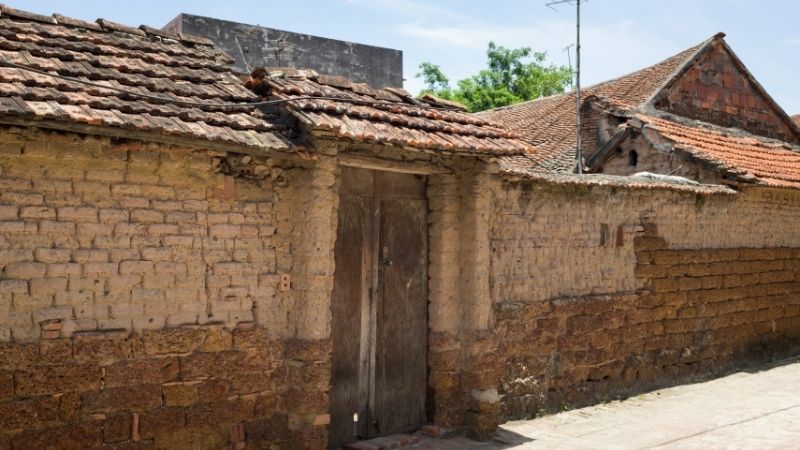
Best weather to visit Duong Lam
Tips to travel Duong Lam Ancient Village
- Walking and cycling are the most suitable ways to visit because you can go to every corner of the village without breaking the tranquility and peaceful atmosphere of the old houses here.
- In some attractions, there are some people from the relic management (wearing cards) who will introduce the place to you, giving tips is not required, but these old men are quite enthusiastic to explain to you about the attractions.
- When visiting the old houses, remember to greet family members, politely ask for permission, they will be very friendly to welcome you. If you want to buy something as a gift for people at home, you can buy it right from these families instead of in the market.
- Regarding food and accommodation: If you want to use services such as having lunch or dinner in a homestay, you should find the contact to book first then go out because homestays here are often cooking after having the order.
The ticket price is very cheap, only 20,000 VND for an adult and 10,000 VND for a child.
Attractions nearby Duong Lam Ancient Village
Son Tay Ancient Citadel: Son Tay Ancient Citadel is an ancient military architecture located in the center of Son Tay town, built in the 3rd year of Minh Mang (1822). This is one of 20 citadels built during the Nguyen Dynasty, but only Son Tay Ancient Citadel was built full of laterite. The citadel has an area of 16 ha, surrounded by a moat, the wall is structured in the Vauban architectural style (fortresses were placed in protruding parts). On the surface of the citadel, there are many holes to help soldiers observe and fight. Son Tay Ancient Citadel has 4 gates facing the North, South, West, and East directions, namely: Hau gate (Back Gate), Tien gate (Front Gate), Huu door (Right gate), Ta gate (Left gate). In the past, all four gates had brick bridges spanning the moat, but now there are only two main gates: Tien and Hau gates. Today, gazebo and gun emplacements on the gates still retain their ancient pristine looks.
Va Temple: Va Temple was built on a wide hill, surrounded by hundreds of ancient iron tree: 85 ancient iron trees and four other ancient trees was recognized as heritage trees. According to the epitaph erected in the 36th year of Tu Duc (1883) at the temple, Va Temple has existed since the time of Vietnam under the dominance of the Tang dynasty. Until now, the temple has restored 3 times. In Va temple, there are many ancient relics still preserved: Duc Quoc Mau ancestral tablet, four statues of the “Tu Tran”, 47 pair of wood panels, 18 horizontal lacquered board, 2 stone steles, etc. Every year, Va Temple festival organizes in January and September (lunar calendar) to pay tribute to Duc Thanh Tan god to the country.
Vietnamese Ethnic Groups Cultural Village: The Village is a place to show the life of ethnic groups throughout Vietnam, built on a small hill surrounded by many valleys and lakes. Therefore, the location is very beautiful with many kinds of landscapes that suitable for visiting, learning about the life, culture, and customs of 54 ethnic groups in Vietnam. There are many festivals that take place in Vietnam Ethnic Groups Culture Village every year, the festivals held with the cultural and spiritual beauty of each community. If you have the opportunity to come here, you should try to visit all the unique features of residential architecture. Specially, you will be introduced to their habits, customs, and community activities, let's explore the diversity in the lifestyles and beliefs of the ethnic groups here.
Join our Duong Lam tour to get a deep understanding of Duong Lam Village with our professional guide.
Trip that visit Duong Lam Ancient Village
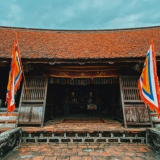
Duong Lam Ancient Village Map
Questions & Answers (1)
May I please have information on where to spend a night in Duong Lam Village? Thank you
We only have option homestay with local
